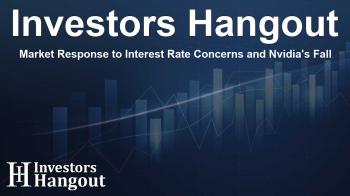Market Response to Interest Rate Concerns and Nvidia's Fall

Market Overview Amidst Rate Speculations
The U.S. stock index futures experienced minimal movement on a recent evening, reflecting the market's response to growing uncertainties surrounding interest rates. The decline in NVIDIA Corporation (NASDAQ: NVDA) has significantly affected investor sentiment, especially in the technology sector.
Nvidia's recent performance revealed substantial losses, contributing to a broader downturn in tech stocks, coinciding with an uptick in Treasury yields. This rise follows the release of economic data that indicated persistent inflationary pressures, reinforcing expectations for a more cautious approach from the Federal Reserve regarding monetary easing.
Impact of Nvidia's Performance on Technology Sector
Nvidia emerged as the poorest performing major technology stock recently, witnessing a 6.2% dip from its record highs. Interestingly, there was a slight rebound in aftermarket trading.
During a keynote address at the Consumer Electronics Show, CEO Jensen Huang announced an array of innovative products, from advanced graphics chips to new partnerships in the autonomous driving space. He revealed that the next generation of Blackwell AI chips had begun mass production, indicating a forward-looking approach for the company.
Despite these positive developments for Nvidia’s long-term strategy, analysts pointed out that near-term expectations might not see an immediate boost. The prior rally in Nvidia's stock, which tripled in market value throughout the year, suggested much of the promising news was already reflected in the stock price.
The stock's sharp decline can be attributed to profit-taking behavior by investors after its substantial surge. Other tech giants also faced declines, with Apple Inc (NASDAQ: AAPL) dropping over 1% amid recent negative ratings. Tesla Inc (NASDAQ: TSLA) fell 4.1% following a downgrade from Bank of America, citing concerns over high valuations and ambitious plans in the AI sector.
Market Sentiment: Inflation and Interest Rates
Wall Street faced increased pressure as indices recorded declines, primarily fueled by a surge in Treasury yields. The strong economic indicators, particularly in job openings, suggest a robust labor market that could constrain the Fed's ability to perform significant rate cuts in the near future.
Moreover, a positive purchasing managers index heightened worries over persistent inflation. This combination of sticky inflation and labor market strength has led analysts to predict limited incentives for the Fed to cut rates sharply soon, a sentiment echoed by Fed officials in recent discussions.
The market is currently focusing on upcoming economic data, particularly the nonfarm payrolls report for December, to gauge potential shifts in interest rate policy. Recent trends have seen the S&P 500 index decreasing by 1.1% to 5,909.50 points and the NASDAQ Composite falling 1.9% to 19,491.65 points.
Looking Ahead: Key Economic Indicators
Investors are keenly awaiting the release of nonfarm payrolls data, which is slated to provide further insights into the job market and broader economic conditions. Should the data continue to indicate strength, it may solidify expectations for the Fed maintaining its stance on interest rates. Volatility is expected as market participants react to evolving economic narratives.
Frequently Asked Questions
What are the main factors affecting U.S. stock futures currently?
The key factors include Nvidia's significant losses, concerns over inflation, and the possible implications for interest rate adjustments by the Federal Reserve.
How has Nvidia's performance influenced the tech sector?
Nvidia's substantial decline has negatively impacted investor sentiment, leading to decreased stock prices of other major technology companies.
What is the significance of the upcoming nonfarm payrolls data?
This data is crucial as it will provide insights into the labor market's health and could influence the Federal Reserve's decisions regarding interest rates.
Why are analysts concerned about inflation and interest rates?
Persistent inflation and a strong labor market may limit the Federal Reserve's ability to execute sharp rate cuts, which is a concern for market stability.
What is the outlook for the stock market moving forward?
The stock market is likely to remain volatile, with focus on upcoming economic indicators and the Federal Reserve's policy decisions.
About Investors Hangout
Investors Hangout is a leading online stock forum for financial discussion and learning, offering a wide range of free tools and resources. It draws in traders of all levels, who exchange market knowledge, investigate trading tactics, and keep an eye on industry developments in real time. Featuring financial articles, stock message boards, quotes, charts, company profiles, and live news updates. Through cooperative learning and a wealth of informational resources, it helps users from novices creating their first portfolios to experts honing their techniques. Join Investors Hangout today: https://investorshangout.com/
Disclaimer: The content of this article is solely for general informational purposes only; it does not represent legal, financial, or investment advice. Investors Hangout does not offer financial advice; the author is not a licensed financial advisor. Consult a qualified advisor before making any financial or investment decisions based on this article. The author's interpretation of publicly available data shapes the opinions presented here; as a result, they should not be taken as advice to purchase, sell, or hold any securities mentioned or any other investments. The author does not guarantee the accuracy, completeness, or timeliness of any material, providing it "as is." Information and market conditions may change; past performance is not indicative of future outcomes. If any of the material offered here is inaccurate, please contact us for corrections.
